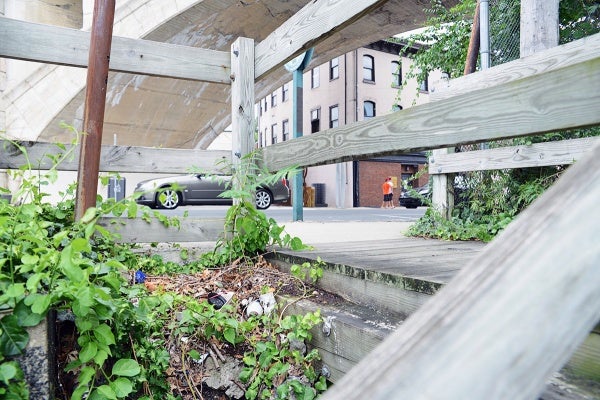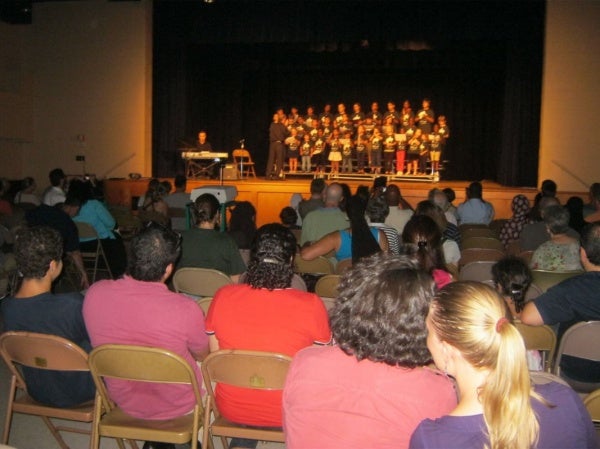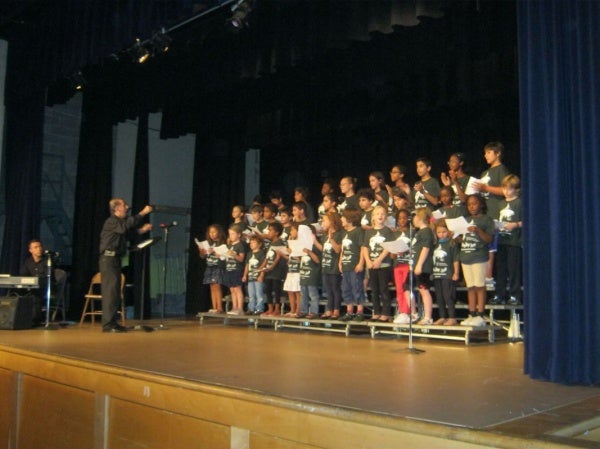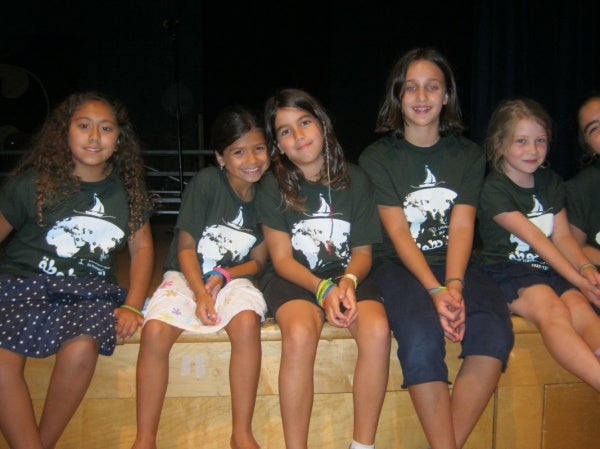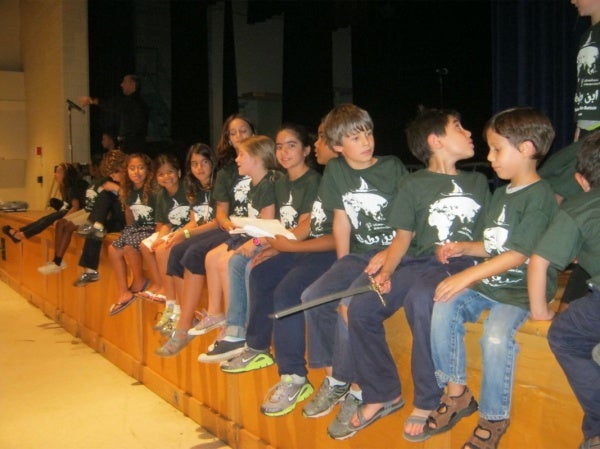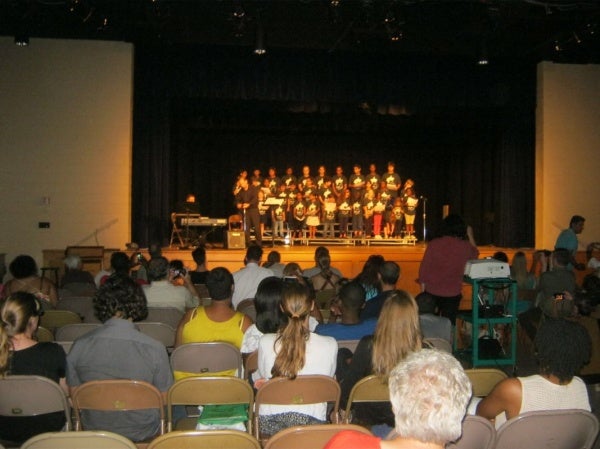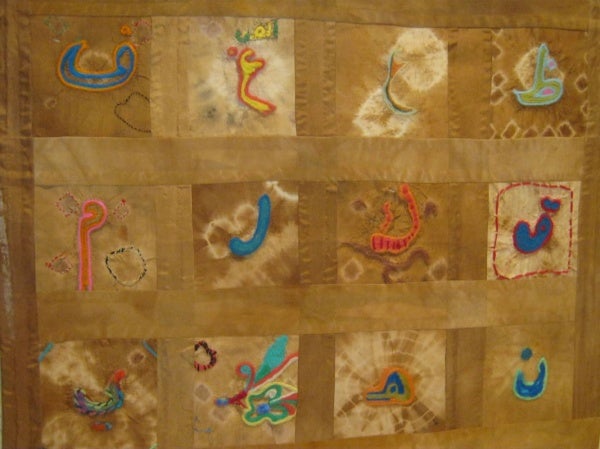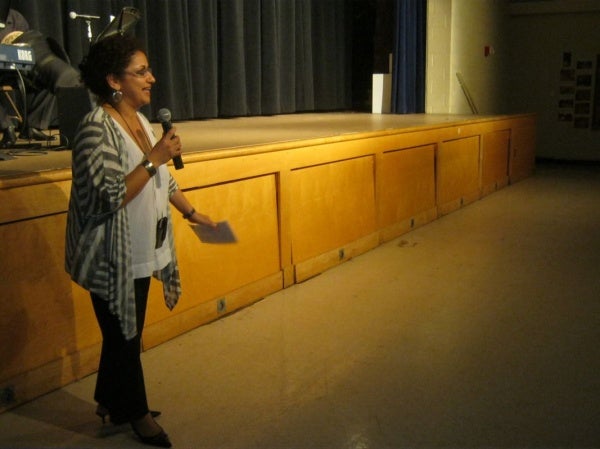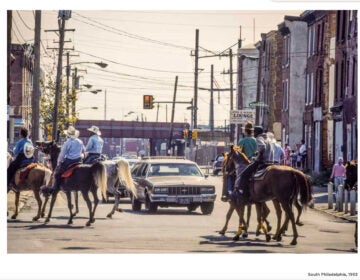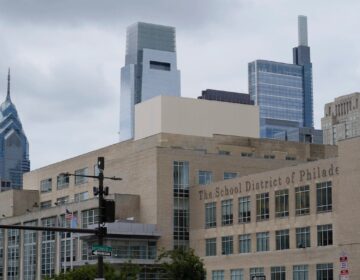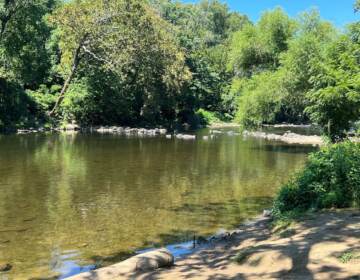Summer camp in Chestnut Hill helps kids learn about Arab culture
Al-Bustan Day Camp theater teacher Justin Poole, with the composure of a man who has just finished rehearsing a show with forty children in it, said that a “healthy amount of creative chaos” means things are right on target. Thursday was the penultimate day of the three-week summer camp, now in its 11th year. The camp has taken place at Chestnut Hill Springside Academy since 2006.
Al-Bustan Seeds of Culture, a non-profit based in West Philadelphia, began as a two-week summer camp and now operates as a year-round arts and culture program celebrating Arabic language and heritage, partnering with many local schools.
Before the campers (from barely five years old to sixteen) launched their Thursday performance on the Springside stage for family and friends, everyone gathered in the cafeteria’s late-afternoon sunshine to share a potluck dinner of lamb and chicken, couscous, hummus and pita, stuffed grape leaves, stewed vegetables and watermelon.
Al-Bustan is not meant just for children of Arabic heritage. The noisy tables at Springside were a sea of everything from blond ponytails to dreadlocks to headscarves, including many interracial families.
Hazami Sayed, Al-Bustan Founder and Executive Director, noted that for several years, about two-thirds of the campers had Arabic roots. Now she estimates that a majority of campers are non-Arab, and campers of all ethnic backgrounds have embraced lessons in Arabic language, percussion, music, and arts.
Parent Ann Farnsworth-Alvear, a History professor at the University of Pennsylvania, was surprised to see her teenage daughter, Kiamesso, take such an avid interest in the language, given Farnsworth-Alvear’s Columbian roots and a family emphasis on Spanish. Kiamesso has now done the camp for six years.
“It’s not me sending them,” Farnsworth-Alvear said, explaining that her kids make their own demands to attend. She touted the unusual “verve” of the program, and its many opportunities for cross-cultural exploration.
Al-Bustan board member Omar Harb has seen his own kids, ages 6 and 10, take to the program. Too often, he says, our introduction to Arabic culture comes through the fraught realms of religion or politics. At Al-Bustan, campers approach the curriculum with language studies, drama, drumming, poetry, song, and hands-on arts and crafts that all weave into a larger cultural context.
Harb enjoyed seeing his son turn his lunchbox into a drum, to show his new skills on the ride home.
Each summer has a theme
Each year, the camp has a different theme, Sayed explained. This summer, all of the camper’s projects took root in the story of Ibn Battuta, at 14th-century traveler beyond compare.
The Moroccan-born Abu Abdulla Muhammad Ibn Battuta departed from Tangier in 1304 and did not return home for thirty years. His route, now estimated at about 75,000 miles (an almost unimaginable distance in Medieval times), took him through modern-day Iraq, Yemen, Algiers, Tunis, Egypt, Palestine and Syria. He explored Constantinople and Ukraine, Delhi, the Maldives, Peking, Spain and East Africa.
“It’s very rich material from all disciplines,” Sayed said. This year, the kids’ projects including a Henna-dyed, hand-felted Arabic letter quilt, Moroccan song and cuisine, and poetry inspired by journeys.
Nine-year-old Eden, in her third year at Al-Bustan, especially enjoyed the chance to sing and dance onstage.
“It’s different from other camps,” said Harb’s 10-year-old daughter Amani, who loves the friendly atmosphere and the music classes.
Ten-year-old Miriam has been coming to the camp for four years from a very long distance: she’s from Lebanon, but visits her cousins in the US every summer.
“I like the camp because it gives me a chance to feel proud of Arab culture,” she said, explaining that at home in Lebanon, she doesn’t recognize the same pride.
The oldest campers’ roots were astonishingly diverse. Their families hailed from Sudan, Bangladesh, Egypt, China, Sierra Leone, Guyana, the US and Haiti. Some had fled disaster or war. They enjoyed a special video production class that allowed to them to make a short documentary about their cultural origins.
Fifteen-year-old camper Byquill took a special interest in Arabic language, for its beautiful shapes and challenging pronunciations. In the future, he hopes to pursue Arabic classes in college.
Camp-mate Rabiyatu, 16, understands Arabic’s challenges, noting that she has been studying the language for ten years and still has yet to completely master it.
Fifteen-year-old Jaelle liked the Al-Bustan poetry classes the most. “It doesn’t feel like a class,” she said of teacher Ellie Hutchison’s course. “It feels like a place where you can speak your mind.”
Stalwart parents settled in for a two-hour performance of singing, drumming, and original poems and drama (“ask me not for baklava; ask me for knowledge”), with no shortage of world-class mugging.
Early on, one very shy young singer at stage left attempted a compromise by turning his back to the audience. When a staffer attempted to turn him around, he marched off the stage with regal, albeit teary, determination.
On the other hand, another youngster interrupted teacher Hafez El Ali Kotain to announce his drum skills to the entire audience, and burst into an impromptu solo.
Prior to the performance, Harb’s son announced that he was afraid to do things in front of other people – “except for at Al-Bustan.”
WHYY is your source for fact-based, in-depth journalism and information. As a nonprofit organization, we rely on financial support from readers like you. Please give today.






